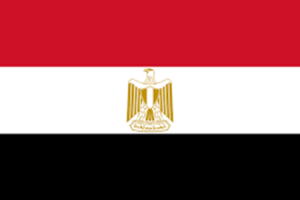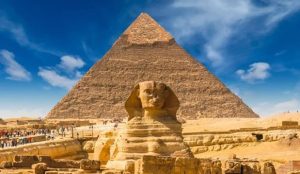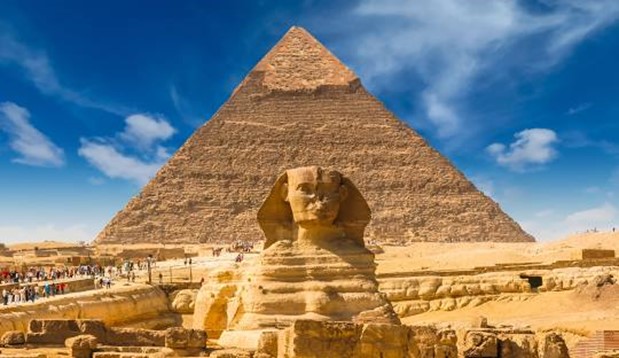EGYPT
EGYPT
The Timeless Enigma of the Nile:

Egypt, nestled in the northeastern corner of Africa, boasts an extraordinary historical legacy that beckons us back to the dawn of civilization. At its heart lies the Nile River valley and delta, where a remarkable civilization emerged, rivaling the great Mesopotamian societies in the distant East. This ancient land witnessed over three millennia of Pharaonic splendor, marked by native dynasties intertwined with fleeting foreign dominion.
In 323 BC, the indomitable Alexander the Great conquered Egypt, seamlessly integrating it into the Hellenistic world. The Greek Ptolemaic dynasty nurtured an advanced, literate society in the radiant city of Alexandria. Nevertheless, Egypt’s destiny soon changed hands as the Romans claimed dominion in 30 BC. The country’s fate shifted yet again when Arab Muslim forces triumphantly overtook it in 639–642 AD, uniting it with the Byzantine Empire, Rome’s successor state.
Despite the ever-changing tides of history, Egyptian rural life remained astonishingly continuous, unmarred by the fluctuating rulers and cosmopolitan urban centers. The essence of these agrarian communities, intimately bound to the annual ebb and flow of the Nile River, persisted unchanged for centuries. However, a pivotal transformation followed the Muslim conquest, when both urban and rural domains began to embrace Arab culture. Gradually, the mellifluous Arabic language supplanted the native Egyptian tongue as the lingua franca of the land.

Since those transformative days, Egypt’s narrative has been intertwined with the broader Islamic world. While foreign elites—be they Arab, Kurd, Circassian, or Turkish—exercised rule over the Egyptian populace, the nation’s cultural tapestry retained a predominantly Arab identity. Today, Egypt stands as a captivating crossroads of civilizations, its past a testament to resilience and adaptation, its present a harmonious blend of cultures, and its future an intriguing journey into the unknown.
give me some important question and answers for this topic”EGYPT”.
- Q: What is the capital city of Egypt?
- A: The capital city of Egypt is Cairo.
- Q: What is the official language of Egypt?
- A: The official language of Egypt is Arabic.
- Q: Can you provide a brief overview of Egypt’s geography and its key landmarks?
- A: Egypt is located in the northeastern region of Africa and is known for the Nile River, the Pyramids of Giza, the Sphinx, and the Valley of the Kings.
- Q: What is the population of Egypt, and what are the major religions practiced in the country?
- A: As of my last knowledge update in 2022, Egypt has a population of over 100 million people. The majority of Egyptians practice Islam, with a significant Christian minority.
- Q: What is the currency used in Egypt?
- A: The official currency of Egypt is the Egyptian Pound (EGP).
- Q: Could you provide an overview of Egypt’s ancient history, including its contributions to civilization?
- A: Egypt has a rich ancient history, known for its Pharaonic civilization, the construction of the Pyramids, the Sphinx, and advancements in fields like mathematics and medicine.
- Q: How is the government structured in Egypt, and who is the current head of state?
- A: Egypt is a republic with a president as the head of state. As of my last knowledge update in 2022, President Abdel Fattah el-Sisi was in office.
- Q: What role does the Nile River play in Egypt’s history, economy, and daily life?
- A: The Nile River is crucial to Egypt’s history and economy, providing fertile soil for agriculture and serving as a major transportation route. It has shaped Egyptian civilization for thousands of years.
- Q: How has Egypt been affected by recent geopolitical events in the Middle East and North Africa?
- A: Egypt has been impacted by various geopolitical events, including the Arab Spring. Its role in regional politics and its efforts to maintain stability have been noteworthy.
- Q: What are some of the famous cultural festivals and traditions celebrated in Egypt?
- A: Egypt celebrates several cultural festivals, including Eid al-Fitr and Eid al-Adha in the Islamic calendar. Additionally, events like the Cairo International Film Festival and cultural celebrations like Sham el-Nessim are popular.
- Q: How does tourism contribute to Egypt’s economy, and what are some of the major tourist attractions?
- A: Tourism is a significant contributor to Egypt’s economy. Major attractions include the Pyramids of Giza, Luxor, Aswan, the Egyptian Museum in Cairo, and Red Sea resorts like Sharm El Sheikh.
- Q: What are some of the economic challenges faced by Egypt, and how is the government addressing them?
- A: Egypt faces economic challenges such as high unemployment and inflation. The government has implemented economic reforms and infrastructure projects to stimulate growth.
- Q: Can you elaborate on Egypt’s role in regional politics and its diplomatic relations with neighboring countries?
- A: Egypt plays a key role in regional politics, participating in organizations like the Arab League. It has diplomatic relations with neighboring countries and is involved in discussions on various regional issues.
- Q: How has Egypt addressed environmental challenges, particularly issues related to water scarcity and the impact of the Aswan High Dam?
- A: Egypt faces challenges related to water scarcity, and the construction of the Aswan High Dam has both positive and negative effects. The country has implemented water management strategies to address these issues.
- Q: What are some of the UNESCO World Heritage Sites in Egypt, and why are they significant?
- A: Egypt has several UNESCO World Heritage Sites, including the Pyramids of Giza, the ancient city of Thebes, and the Abu Mena archaeological site, recognized for their cultural and historical importance.

